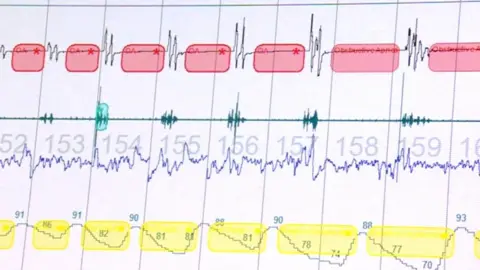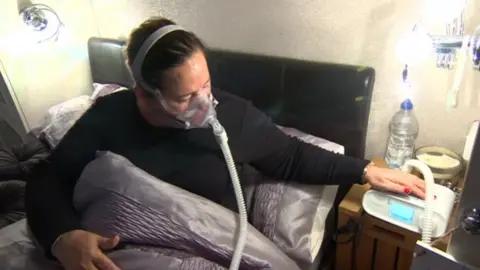Sleep disorder testing carried out by NHS doubles
 BBC News
BBC NewsThe number of tests carried out by the NHS to diagnose people with sleep disorders across England has doubled in the past decade, figures reveal.
NHS data shows that 147,610 sleep diagnostic tests were carried out last year - compared with 69,919 in 2007-08.
The tests are designed to identify sleep apnoea, a condition that causes people to stop breathing during sleep.
One patient told the BBC the problem was so acute it had driven her to contemplate suicide.
"At one stage, my life was so awful because of how little sleep I was getting that I wanted to kill myself," Carole Bennett, from Leeds, said.
"When I got tested for sleep apnoea the doctors found that whilst I was asleep, I'd stop breathing 27 times in just one hour."
 BBC News
BBC NewsJosie Beatson, from Sheffield, said that before receiving treatment for her sleep apnoea, the condition had a terrible impact on her life.
She said: "It's embarrassing to be at work and have your colleagues wake you up because they can hear you snoring.
"The condition turned me into a recluse. I was so exhausted all the time that I didn't want to socialise, and because of my loud snoring I was too embarrassed to go and sleep at anyone else's house."
Sleep apnoea is the most common sleep disorder, according to the NHS. It is caused when the muscles and soft tissue in the throat relax, causing a blockage of the airways.
The lack of oxygen to the brain causes those with the condition to wake up or have regular interruptions to their sleep. Common symptoms include loud snoring or gasping and grunting whilst asleep.
Those with the condition can choose to manage it by wearing an oxygen mask at night, or other oral devices that keep the airways open. Many are encouraged to lose weight and in some cases people can undergo surgery to remove excess tissue in their passageways.
Analysing data collected by NHS England, the BBC has found the number of sleeping disorder tests has increased every year over the past decade.
NHS South Sefton in Liverpool had the highest rate of sleep diagnostic tests being commissioned last year.
Doctors attribute the rise in the number of sleep tests to a greater sense of public awareness about the wider health implications of not getting enough sleep.
"Sleep apnoea is a serious condition which can lead to other problems such as high blood pressure, which in turn can lead to strokes and heart attacks," said Dr Stephen Bianchi from Sheffield's Northern General Hospital.
It is estimated that about 1.5 million people in the UK suffer from the condition, although doctors warn many people will have never been formally diagnosed.
"We think about 2% of females, and 4% of males in the UK have significant sleep apnoea. However, we suspect that 80% of those with the condition are unaware they have it," Dr Bianchi added.

'I hit my wife in my sleep'
Consultants at Sheffield Teaching Hospitals NHS Trust have been pioneering new ways of treating a range of sleep disorders.
Patients with sleep apnoea are often tested for neurological sleep conditions such as insomnias and rapid eye movement (REM) disorders.
Iain Gordon, from Doncaster, has an REM behaviour disorder, which sees him physically act out his dreams when he's asleep.
"If I have a dream that I'm fighting crocodiles or jumping off a cliff, I will shout and kick out.
"But the reason why I've now sought help is because there have been instances recently where I've hit my wife whilst I've been asleep."
Dr Gary Dennis, from the Hallamshire Hospital in Sheffield, said sleep disorders could have "wide and unpredictable" outcomes.
'Sleep hygiene'
One sleep disorder sufferer, Brian Thomas from Neath in south Wales, killed his wife during a violent nightmare and was told by a judge he "bore no responsibility".
"REM disorders are not inconsequential," said Dr Dennis.
"At one end of the spectrum I've had the spouses of my patients who have needed dental work because they've been hit by their bed partner. But then at the other end I've had patients who have managed to drive themselves to the petrol station while they've been asleep."
Clinicians like Dr Dennis believe people need to pay more attention to their own "sleep hygiene" including diet, lifestyle and cutting down on late-night phone and tablet use.
"These devices emit blue light and there is a clear association between using these devices late at night and then having poor amounts of sleep," he said.
"Put simply lots of people think sleep gets in the way of life, but I see it the other way round. You can get more out of life, by getting more sleep."

Viewers in Yorkshire can see more about this story on BBC Look North at 1830 on BBC One on Tuesday 20 June, or afterwards on BBC iPlayer.
Additional reporting by Nicola Hudson and Charles Heslett.
